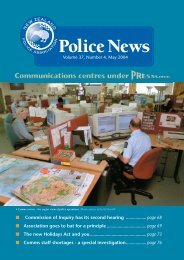Police News June 09.indd - New Zealand Police Association
Police News June 09.indd - New Zealand Police Association
Police News June 09.indd - New Zealand Police Association
You also want an ePaper? Increase the reach of your titles
YUMPU automatically turns print PDFs into web optimized ePapers that Google loves.
<strong>New</strong> <strong>Zealand</strong> <strong>Police</strong> <strong>Association</strong>• A person with ASD may not react well to changes in routine orthe presence of strangers. This in itself is likely to cause sensoryoverload, confusion and distress. Many don’t understand thesignificance of a <strong>Police</strong> uniform or what a police officer does;• Try to avoid stopping repetitive behaviour unless there is a risk ofinjury to themselves or others. Many individuals, when stressed, willperform strange acts to calm themselves, such as hand flapping,jumping, fiddling with their hands, repeating the same phrasesover and over again. Stopping it may cause the person to becomeaggressive;• Be aware that up to 40% of persons with ASD are prone to seizuresand many suffer from epilepsy;• It’s estimated that up to 50% are non-verbal and are accustomedto communicating visually, such as using the PECS system (PictureExchange Communication System). If the parent or caregiver ispresent ask them about this. Be prepared to use hand gestures orsign language to communicate if need be;• Aggression is usually a result of the person being highly stressed,often caused by frustration, or fear or change in routine (for autisticpeople aggression is not necessarily caused by anger);• If a person’s behaviour appears to escalate, try and use geographiccontainment, back off and maintain a safe distance until thebehaviour decreases;• Check for injuries, some persons with ASD self-harm when highlyagitated, such as banging their heads against objects and punchingwalls. They often have a high pain threshold and may not ask for helpor display any indication of pain even though they could be injured;• Many have little understanding of cause and effect or the subsequentconsequences;• Care should be taken during the interview process. Ideally, anadvocate or caregiver should accompany the ASD person. Thisis due to the possible propensity for the higher functioning verbalautistic person to sometimes wish to “please” the interviewer withexaggerated or inaccurate information; and• Use your discretion, be patient and try to avoid rushing things.It’s fairly common for persons with ASD to go missing. Now if they arefrom the lower end of the spectrum they’re often expert escape artists or“runners”. Many have no road sense or any concept of danger and maytravel large distances very quickly. Drowning is the leading cause of deathfor those in this group. Many have a fascination with water and will seekit out at every opportunity. So remember to check local pools, ponds,creeks, rivers, lakes etc.Lastly, having a person with ASD in your custody, for whatever reason,can be a stressful experience for both parties. We rely heavily on thesupport of Mental Health to assist us when handling a person witha mental disability, such as ASD. However, as Nelson staff recentlydiscovered this is not always the case.Despite repeated calls from police, a judge and the mother of the autisticteen, a mental health specialist from MHO Nelson/Marlborough, refusedto help, stating Emma’s problem was behavioural, that she didn’t have amental illness and therefore wasn’t covered under the Mental Health Act.Huge ramificationsNow this highly contentious decision has huge ramifications for <strong>Police</strong>and unless clarification is forthcoming from the Ministry of Health weagain will find ourselves being used as the “ambulance at the bottom ofthe cliff”.Thankfully, in this instance, a member of the local Autistic <strong>Association</strong>worked with staff to care for Emma while she spent several days in policecustody. After a court ruling, she was eventually placed under the MentalHealth Act at “Hillmorton” facility in Christchurch.Mental Health’s failure to assist police officers on this occasion is a realconcern. My advice if you find yourself in this position would be to contactyour local branch of the Autistic <strong>Association</strong> for help and advice. Althoughnot ideal, at the very least they can advise on how best to handle theperson you have in your custody.Hopefully, this information has given some insight into dealing with thoseon the autistic spectrum. The numbers dictate that sooner or later you arelikely to encounter an individual with autism and this information mightmake that interaction more successful.The contact details for Autism <strong>New</strong> <strong>Zealand</strong> Inc are:Website: www.autismnz.org.nz Email: info@autismnz.org.nzFreephone: 0800 288-476Ila shows theboys how it’sdone• Senior Constable Jason Toddand his police dog Ila tookout the National <strong>Police</strong> DogChampionships recently. Thethree-day competition saw Ilabecome the first bitch ever totake the title. Ila is a specialistArmed Offenders Squad dog andas such had no time to rest on herlaurels, being required for dutiesat the recent Napier shootingsiege. What Ila lacks in size, shecertainly makes up for in quality.Constable Todd described her as“a dog with a lot of heart” andthat was evident for all to see atthe champs.- Photo courtesy of The Dominion Post/Craig Simcox.<strong>June</strong> 2009125

















